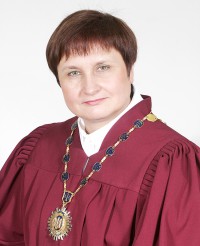Supreme Court of Ukraine judge Ludmila Okhrimchuk: “Our goal is to increase public confidence in the Ukrainian judicial system”
February 09, 2016
How does a judicial system conduct an open dialogue with the public that inspires trust and public support? To discuss this and other questions related to communications and trust, representatives of the Ukrainian judicial system were invited to the Netherlands by the Ministry of Foreign Affairs of the Netherlands and the Netherlands Enterprise Agency with the support of the European Union Advisory Mission to Ukraine (EUAM).
The level of public confidence in state authorities – including the judicial system – in the Netherlands stands at over 70%. Part of this success is due to effective communication of judicial decisions and transparency. To help build levels of trust in Ukraine’s judicial system, EUAM has been closely cooperating with the Ukrainian judicial authorities to provide strategic communications advice.
Ludmila Okhrimchuk, a Supreme Court of Ukraine judge, told us how Dutch communications approaches might be useful:

Strengthening
and improving of the Ukrainian judicial system’s efficiency, transparency and
accessibility to ordinary citizens according to the best European
practices are crucial. Our strategic goal is ultimately to increase public
confidence in the Ukrainian judicial system.
I am taking part in a joint project between the Supreme Court of Ukraine and EUAM, and as part of this communications project, I studied the Dutch experience of judicial communications during a study visit to the Netherlands.
In the Netherlands, there is a fundamental legal principle that cases should be carried out openly and that “the court must speak through its decisions”. I believe that in Ukraine, we can learn from this strategy in the development of communications strategies.
One way in which Dutch courts successfully communicate to the public is via the media, particularly journalists with specialised legal experience. In order to create a climate of transparency and openness, it is necessary to give the media time to prepare before major court decisions and use press releases, press announcements and summaries of judgements effectively. The media should also be invited to presentations of reports, particularly the annual report. This approach will significantly improve media coverage of court decisions.
Press guidelines developed in 2008, which are freely available on the internet, have contributed to the increasing of transparency to the media.
The Dutch communication approach doesn’t specify to the media what can and can’t be covered, rather it offers a clear understanding of how courts provide services to the media.
The Supreme Court of the Netherlands also has a number of interesting and successful initiatives, for example:
- Short films about the work of the Supreme Court where the judges talk about the court and explain their tasks
- A programme of court visits, where law students can listen to judges talk about their work and ask questions
- Open days for the public during which people can learn about the history of the building and ask the judges questions
In my opinion, the long experience of Dutch colleagues in communications activities increases public confidence in the judiciary and should be used as part of the reforms to the Ukrainian judicial system.
The media can be considered the ‘eyes and ears’ of the public and it is therefore particularly important to do everything possible to attract the media’s interest in our activities and meet the media’s expectations.
Finally, I want to thank EUAM for organising the study visit to the Netherlands. It was extremely interesting and will make an important contribution to our work in strengthening confidence in the Ukrainian judicial system.


